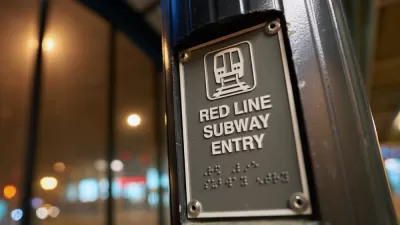A controversial form of value capture, tax increment financing begs for further analysis and understanding. A new report by the Lincoln Institute of Land Policy sheds light on the subject.

Tanvi Misra shares news of a new study by David Merriman, professor at the University of Illinois at Chicago, for the Lincoln Institute of Land Policy that digs into the causes and effects of Tax Increment Financing.
The report, titled "Improving Tax Increment Financing (TIF) for Economic Development," examines available research on the implementation and impacts of TIF before coming to the conclusion "that the mechanism, while helpful in some ways, leaves a lot to be desired," according to Misra.
Misra explains how TIF works, and illuminates some of the common criticisms about TIF in the real world. For instance:
Critics often charge that it funnels money out of the taxpayers’ pockets into a special fund that, by and large, works in a pretty opaque manner. While some of that money funds essential public works, much has also gone towards erecting new Whole Foods, renovating glitzy hotels, and building stadiums—the type of projects, one might argue, should not require such incentives. And the evidence Merriman analyzes suggest [sic] they may have a point. He shows that, in most cases around the country, the tool did not fulfill its main goal of boosting economic development.
The article also includes resources for understanding the controversy surrounding TIF in Chicago, where TIF stays in the news almost constantly.
FULL STORY: The Trouble With TIF

Alabama: Trump Terminates Settlements for Black Communities Harmed By Raw Sewage
Trump deemed the landmark civil rights agreement “illegal DEI and environmental justice policy.”

Study: Maui’s Plan to Convert Vacation Rentals to Long-Term Housing Could Cause Nearly $1 Billion Economic Loss
The plan would reduce visitor accommodation by 25% resulting in 1,900 jobs lost.

Why Should We Subsidize Public Transportation?
Many public transit agencies face financial stress due to rising costs, declining fare revenue, and declining subsidies. Transit advocates must provide a strong business case for increasing public transit funding.

Wind Energy on the Rise Despite Federal Policy Reversal
The Trump administration is revoking federal support for renewable energy, but demand for new projects continues unabated.

Passengers Flock to Caltrain After Electrification
The new electric trains are running faster and more reliably, leading to strong ridership growth on the Bay Area rail system.

Texas Churches Rally Behind ‘Yes in God’s Back Yard’ Legislation
Religious leaders want the state to reduce zoning regulations to streamline leasing church-owned land to housing developers.
Urban Design for Planners 1: Software Tools
This six-course series explores essential urban design concepts using open source software and equips planners with the tools they need to participate fully in the urban design process.
Planning for Universal Design
Learn the tools for implementing Universal Design in planning regulations.
Caltrans
Smith Gee Studio
Institute for Housing and Urban Development Studies (IHS)
City of Grandview
Harvard GSD Executive Education
Toledo-Lucas County Plan Commissions
Salt Lake City
NYU Wagner Graduate School of Public Service




























